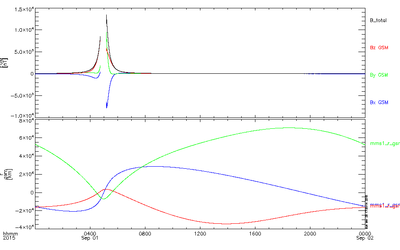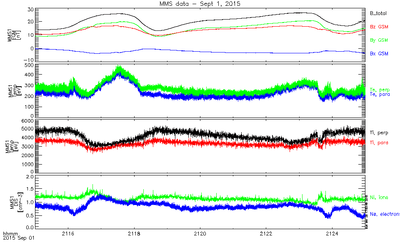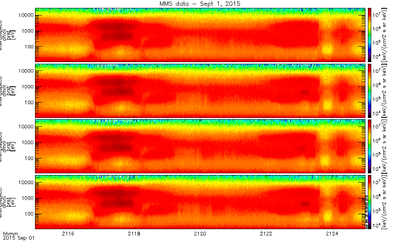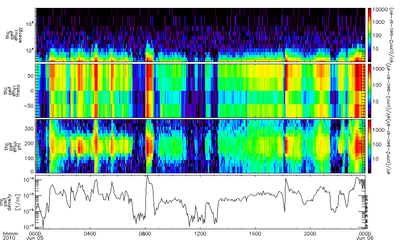Usage examples: Difference between revisions
No edit summary |
(Caption update) |
||
| (15 intermediate revisions by 2 users not shown) | |||
| Line 1: | Line 1: | ||
SPEDAS contains many introductory scripts that you can run and modify in order to learn using IDL and SPEDAS. | |||
== MMS data analysis using SPEDAS: an introduction == | == MMS data analysis using SPEDAS: an introduction == | ||
| Line 9: | Line 8: | ||
This is the script that can be run in IDL: | This is the script that can be run in IDL: | ||
[[File:Test mms1.png|thumb|Screenshot of example test_mms1|upright|400px]] | |||
<code> | <code> | ||
pro test_mms1 | pro test_mms1 | ||
| Line 45: | Line 43: | ||
The scripts in this video are here: | The scripts in this video are here: | ||
[[File:Multiple plot test.png|thumb|Screenshot of example multiple_plot_test|400px|right]] | |||
<code> | <code> | ||
pro multiple_plot_test | |||
mms_init | mms_init | ||
| Line 60: | Line 59: | ||
store_data, 'mms1_des_temps_brst', data=['mms1_des_temppara_brst', 'mms1_des_tempperp_brst'] | store_data, 'mms1_des_temps_brst', data=['mms1_des_temppara_brst', 'mms1_des_tempperp_brst'] | ||
store_data, 'mms1_dis_temps_brst', data=['mms1_dis_temppara_brst', 'mms1_dis_tempperp_brst'] | store_data, 'mms1_dis_temps_brst', data=['mms1_dis_temppara_brst', 'mms1_dis_tempperp_brst'] | ||
store_data, 'mms1_numberdensity_dbcs_brst', data='mms1_d'+['i', 'e']+' | store_data, 'mms1_numberdensity_dbcs_brst', data='mms1_d'+['i', 'e']+'s_numberdensity_brst' | ||
window, 1 | window, 1 | ||
| Line 67: | Line 66: | ||
tlimit, trange, window=1 | tlimit, trange, window=1 | ||
makepng, "C:\mms\mms_2a", window=1 ; save png file mms_2a.png | |||
end | |||
</code> | </code> | ||
Loading and | Loading and plotting data from multiple probes: | ||
[[File:Multiple plot test2.png|thumb|Screenshot of example multiple_plot_test2|400px|right]] | |||
<code> | <code> | ||
pro multiple_plot_test2 | |||
mms_init | mms_init | ||
| Line 84: | Line 85: | ||
window, 1 | window, 1 | ||
tplot, window=1, title='MMS data - Sept 1, 2015', [' | tplot, window=1, title='MMS data - Sept 1, 2015', ['mms1_des_energyspectr_omni_brst', $ | ||
' | 'mms2_des_energyspectr_omni_brst', 'mms3_des_energyspectr_omni_brst', 'mms4_des_energyspectr_omni_brst'] | ||
tlimit, trange, window=1 | tlimit, trange, window=1 | ||
makepng, "C:\mms\mms_2b", window=1 | |||
makepng, "C:\mms\mms_2b", window=1 ; save png file mms_2b.png | |||
end | |||
</code> | |||
== Themis SST plot == | |||
Here is an example script for an SST plot from Themis data: | |||
[[File:Test themis sst.png|thumb|Screenshot of example Test_themis_sst|400px]] | |||
<code> | |||
pro test_themis_sst | |||
trange = ['2010-06-05','2010-06-06'] | |||
;set the date and duration (in days) | |||
timespan,trange | |||
;set the spacecraft | |||
probe = 'c' | |||
;set the datatype | |||
datatype = 'psif' ;(psef for electrons, psib/pseb for burst mode, psir/pser for reduced mode) | |||
;loads particle data for data type | |||
thm_part_load,probe=probe,datatype=datatype | |||
;calculate derived products | |||
thm_part_products,probe=probe,datatype=datatype,trange=trange,outputs =['energy','theta','phi','moments'] | |||
;view the loaded data names | |||
tplot_names | |||
;plot the energy spectrogram, and angular spectrograms(despun spacecraft coordinates (DSL)) | |||
tplot,['th'+probe+'_psif_eflux_energy','th'+probe+'_psif_eflux_theta','th'+probe+'_psif_eflux_phi','th'+probe+'_psif_density'] | |||
end | |||
</code> | |||
== More examples == | |||
The source code of SPEDAS contains many code examples and crib sheets. For each mission included in SPEDAS, there is a directory called "examples" that contains code samples. See the directories: | |||
<code> | |||
projects/mms/examples | |||
projects/themis/examples | |||
projects/iugonet/examples | |||
... etc ... | |||
</code> | </code> | ||
Latest revision as of 19:17, 11 June 2018
SPEDAS contains many introductory scripts that you can run and modify in order to learn using IDL and SPEDAS.
MMS data analysis using SPEDAS: an introduction
This video shows a step-by-step introduction on how to use SPEDAS to make a simple plot:
http://www.youtube.com/watch?v=390FguKn7w4
This is the script that can be run in IDL:

pro test_mms1
mms_init
; Select a time range
trange = ['2015-09-01/21:15', '2015-09-01/21:25']
; Select a probe
probe = 1
; Load FGM data
mms_load_fgm, probe=probe, trange=trange, level='l2'
; Load position data
mms_load_mec, probe=probe, trange=trange, level='l2'
; Select quantities to plot
vars = ['mms1_fgm_b_gsm_srvy_l2', 'mms1_mec_r_gsm']
; Plot data
tplot, vars
end
MMS multi-instrument plots
This video shows how to create multi-panel plots with SPEDAS and how to load data from multiple satellite probes:
http://www.youtube.com/watch?v=yV2NJeiIQsw
The scripts in this video are here:

pro multiple_plot_test
mms_init
trange = ['2015-09-01/21:15', '2015-09-01/21:25']
probes=['1']
mms_load_fgm, probes=probes, trange=trange, level='l2'
mms_load_fpi, probes=probes, trange=trange, level='l2', datatype=['des-moms', 'dis-moms'], data_rate='brst'
join_vec, 'mms1_des_bulk'+['x', 'y', 'z']+'_dbcs_brst', 'mms1_des_bulk_vel_dbcs'
join_vec, 'mms1_dis_bulk'+['x', 'y', 'z']+'_dbcs_brst', 'mms1_dis_bulk_vel_dbcs'
store_data, 'mms1_des_temps_brst', data=['mms1_des_temppara_brst', 'mms1_des_tempperp_brst']
store_data, 'mms1_dis_temps_brst', data=['mms1_dis_temppara_brst', 'mms1_dis_tempperp_brst']
store_data, 'mms1_numberdensity_dbcs_brst', data='mms1_d'+['i', 'e']+'s_numberdensity_brst'
window, 1
tplot, window=1, title='MMS data - Sept 1, 2015', ['mms1_fgm_b_gsm_srvy_l2', 'mms1_des_bulk_vel_dbcs', 'mms1_des_temps_brst', $
'mms1_dis_temps_brst', 'mms1_numberdensity_dbcs_brst', 'mms1_des_energyspectr_omni_avg', 'mms1_dis_energyspectr_omni_avg']
tlimit, trange, window=1
makepng, "C:\mms\mms_2a", window=1 ; save png file mms_2a.png
end
Loading and plotting data from multiple probes:

pro multiple_plot_test2
mms_init
trange = ['2015-09-01/21:15', '2015-09-01/21:25']
probes = ['1','2','3','4']
mms_load_fpi, probes=probes, trange=trange, level='l2', datatype=['des-moms'], data_rate='brst'
window, 1
tplot, window=1, title='MMS data - Sept 1, 2015', ['mms1_des_energyspectr_omni_brst', $
'mms2_des_energyspectr_omni_brst', 'mms3_des_energyspectr_omni_brst', 'mms4_des_energyspectr_omni_brst']
tlimit, trange, window=1
makepng, "C:\mms\mms_2b", window=1 ; save png file mms_2b.png
end
Themis SST plot
Here is an example script for an SST plot from Themis data:

pro test_themis_sst
trange = ['2010-06-05','2010-06-06']
;set the date and duration (in days)
timespan,trange
;set the spacecraft
probe = 'c'
;set the datatype
datatype = 'psif' ;(psef for electrons, psib/pseb for burst mode, psir/pser for reduced mode)
;loads particle data for data type
thm_part_load,probe=probe,datatype=datatype
;calculate derived products
thm_part_products,probe=probe,datatype=datatype,trange=trange,outputs =['energy','theta','phi','moments']
;view the loaded data names
tplot_names
;plot the energy spectrogram, and angular spectrograms(despun spacecraft coordinates (DSL))
tplot,['th'+probe+'_psif_eflux_energy','th'+probe+'_psif_eflux_theta','th'+probe+'_psif_eflux_phi','th'+probe+'_psif_density']
end
More examples
The source code of SPEDAS contains many code examples and crib sheets. For each mission included in SPEDAS, there is a directory called "examples" that contains code samples. See the directories:
projects/mms/examples
projects/themis/examples
projects/iugonet/examples
... etc ...